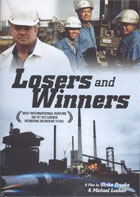
Losers and Winners c2006, 2007 release
Distributed by First Run/Icarus Films, 32 Court St., 21st Floor, Brooklyn, NY 11201; 800-876-1710
Produced by Filmstiftung Nordhein-Westfalen
Directed by Ulrike Franke, Michael Loeken
DVD, color, 96 min.
Sr. High - Adult
Asian Studies, Economics, Globalization, Business, European Studies
Date Entered: 12/04/2007
Reviewed by Cliff Glaviano, Coordinator of Cataloging, Bowling Green State University Libraries, Bowling Green, OHThis documentary chronicles the dismantling of Germany’s most modern coking facility, the Kaiserstuhl coke factory in Dortmund, Ruhr Valley, by a crew of 400 Chinese workers overseen by 30 Germans who served as managers at Kaiserstuhl between 1992 and 2000. The facility was idled in 2000 when the price of coke fell from a high of about $500 per ton to $50 per ton, making it cheaper for the German steel industry to import coke than manufacture it at Kaiserstuhl. In coincidence with falling German steel production was a rise in Chinese steel production that made it attractive for a Chinese investor to purchase the plant, dismantle it for shipping and rebuild it in China. In the film, the Germans seem consumed with the bureaucracy of permits and workplace safety while the Chinese are most interested in quickly finishing the project and returning home. There are very different opinions held as to whether the Chinese actually obey any of the German safety regulations.
The quality of the video is excellent. One of the filmmakers, Michael Loeken, also teamed up with Rüdiger Spott to do some beautiful camera work. The editing by Sabine Rollberg is superb. The music chosen for the film is appropriate. Most of the dialogue is in German and Chinese with English subtitles supplied except for the rare use of English in the film.
Losers and Winners is a both a film of subtle ironies and one of enormous cultural contrasts. The Germans seem resigned to observing the fate of their beloved coke plant, nostalgic over their past work environment, and doubtful that the Chinese will ever be able to successfully rebuild the factory in China. The poorly paid Chinese laborers, often subject to fines for production shortfalls, tardiness or poor attitude, are working to reform their lives through hard work overseas, hoping to provide a future for their children, not really themselves. Their Chinese managers, however, appear to make a much higher salary as a very amusing visit to the local Mercedes dealer indicates. It seems likely that the only bonus the laborers will receive is their New Year’s feast, their only recognition the posting of their photo (the honoree wearing a gaudy, ridiculous, red rose sash) on the meeting room bulletin board. All will be happy when the Chinese go home.
This film will be a great addition to video collections in academic and public libraries. It records some of the more subtle effects of globalization on existing cultures that can be imagined, clearly pointing out differences in attitude and outlook between the Germans and the Chinese. It is an open question in this ironically titled work who the real losers and winners are. Meanwhile, the price of coke has risen in Germany and the Kaiserstuhl plant went into production in China in 2006, along with two coke-producing clones. Losers and Winners is highly recommended in support of curricula in economic globalization, Eastern and Western cultural studies.
Awards:
- Best International Feature, 2007 Hot Docs Canadian International Documentary Festival
- Film Critics Award, 2007 Chicago International Documentary Festival
- Best Film, 2007 One World Human Rights Festival
- Gold Remi Award, 2007 Worldfest Independent Film Festival